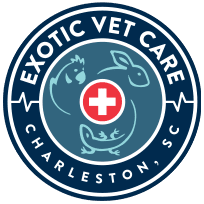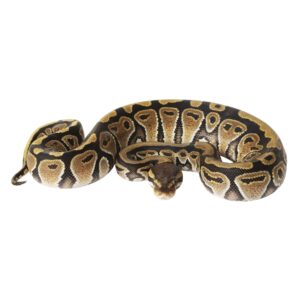In March 2014, my husband Thomas, who is a research scientist at the Tom Yawkey Wildlife Center and Clemson University’s Belle Baruch Institute of Coastal Ecology and Forest Science in Georgetown, received a call that several hatchling white alligators had been discovered in a protected coastal area in South Carolina with public access. With over 20 years of experience studying crocodilians, he was asked to visit the site and assess the status of these animals. He and a team of other wildlife biologists went out to investigate and discovered what appeared to be a mother alligator with several babies nearby. Of those, 4 were normally colored, and 6 were discovered to be leucistic. Leucistic animals are defined as lacking most or all pigment on the body but having dark eyes, while albino animals lack all dark pigment (although other pigments may be present) and have non–pigmented eyes.
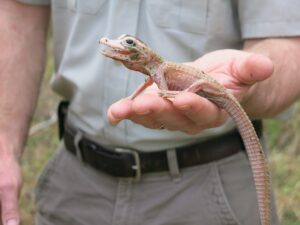 Dr. Thomas Rainwater gently handles a wild-born leucistic alligator, Alligator mississippiensis, before transport to a safe captive environment. Note the dark eye color and patch of brown on the head. Photo by Jane Griess. |
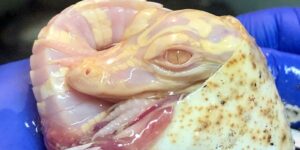 A hatching albino American alligator showing its characteristic pinkish non-pigmented eyes. Photo at https://www.floridatoday.com/story/entertainment/2020/08/12/rare-albino-alligator-babies-hatched-wild-florida/3352966001/ |
Typically, leucistic and albino animals are extremely rare in the wild. True albino animals cannot produce the skin pigment melanin, and although leucistic individuals can produce melanin, they are unable to deposit normal amounts of melanin to the skin. Their white or mostly white bodies often stand out from their backgrounds, unlike their camouflaged conspecifics, which makes them vulnerable to predators. A variety of health problems often accompany these color mutations, which can make albino and leucistic animals further unfit for life in the wild. As an additional concern, there is a high demand for these white-colored animals in the exotic reptile pet trade, with a single individual worth several thousand dollars. Animals collected in the wild by inexperienced people are at risk of ending up in unhealthy, inhumane conditions.
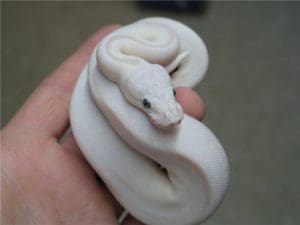 Captive bred leucistic (left) and normal-colored (right) ball pythons, Python regius. The beautiful coloration of these snakes makes them popular in the captive reptile trade, as pets and for breeding. |
Mortality rates for newborn alligators, even normally colored individuals, are extremely high, with only an estimated 1 – 10 % surviving to adulthood. This rate is much lower for albino and leucistic animals. In fact, an adult albino or leucistic alligator has never been documented outside of captivity. Because of the likelihood of congenital health problems, a high susceptibility to predation, and potential collection by reptile traders, the 6 leucistic hatchlings found in South Carolina in 2014 had virtually no chance of survival in the wild.
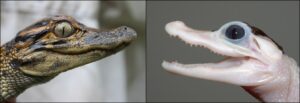
Normal-colored (left) and leucistic (right) baby American alligators. Photos by Tara Gancos Crawford and Bill Hughes (from published account, see reference below).
It was agreed that it would be in the best interest of the animals to remove the leucistic hatchlings from the area, care for them under veterinary supervision, and eventually place them in responsible, accredited captive facilities. I was asked to assess and provide supportive care to the hatchlings, and they were placed temporarily in an alligator holding facility at Hollings Marine Laboratory in Charleston. All were underweight and dehydrated, having survived the winter mostly on their fat stores. They were treated with fluids and antibiotics and provided with clean, heated pools and a diet formulated for growth. Unfortunately, even with the care they received, 3 of the hatchlings died over the following few weeks. However, the 3 remaining individuals ate well and gained weight. After 6 weeks, it was decided that the alligators would be housed in 3 different AZA accredited Aquariums, initially off display, and if doing well, eventually to become educational animals.
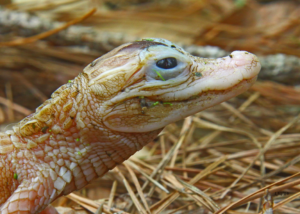
Wild born leucistic alligator hatchling. Photo by Dr. Louis J. Guillette, Jr.
Unfortunately, over the following three years, all 3 of the alligators eventually died, with the last one being lost in 2017. Although they were given excellent care by experienced staff at all three institutions, they all developed bacterial infections, possibly due to underlying immune system deficits.
If you ever see white animals in the wild, enjoy the rare find you have discovered! Just this month a leucistic loggerhead sea turtle hatchling was found on Kiawah Island (https://wpde.com/news/local/rare-white-sea-turtle-hatchling-found-on-kiawah-island). If any animal seems like it could potentially be in danger, please report it to the South Carolina Department of Natural Resources.
For more information, please see our published article:
Rainwater, T.R. et al. 2020. Leucistic American Alligator hatchlings in coastal South Carolina. Southeastern Naturalist 19(4):N62-N72.
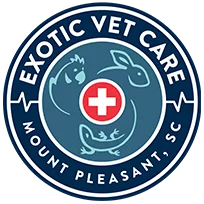
About Us
Our exotic animal hospital is dedicated exclusively to the care of birds, exotic small mammals, reptiles, and even fish! We can offer everything your pet needs for a healthy and happy life, from wellness care and grooming to diagnostics and dentistry, but we can also provide emergency care during our operating hours, along with specialized treatment for referred patients.
